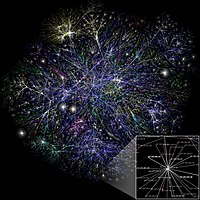
Photo from wikipedia
Several centrality measures have been formulated to quantify the notion of ‘importance’ of actors in social networks. Current measures scrutinize either local or global connectivity of the nodes and have… Click to show full abstract
Several centrality measures have been formulated to quantify the notion of ‘importance’ of actors in social networks. Current measures scrutinize either local or global connectivity of the nodes and have been found to be inadequate for social networks. Ignoring hierarchy and community structure, which are inherent in all human social networks, is the primary cause of this inadequacy. Positional hierarchy and embeddedness of an actor in the community are intuitively crucial determinants of his importance. The theory of social capital asserts that an actor’s importance is derived from his position in network hierarchy as well as from the potential to mobilize resources through intra-community (bonding) and inter-community (bridging) ties. Inspired by this idea, we propose a novel centrality measure social centrality (SC) for actors in social networks. Our measure accounts for—(1) an individual’s propensity to socialize, and (2) his connections within and outside the community. These two factors are suitably aggregated to produce social centrality score. Comparative analysis of SC measure with classical and recent centrality measures using large public networks shows that it consistently produces more realistic ranking of nodes. The inference is based on the available ground truth for each tested networks. Extensive analysis of rankings delivered by SC measure and mapping with known facts in well-studied networks justifies its effectiveness in diverse social networks. Scalability evaluation of SC measure justifies its efficacy for real-world large networks.
Journal Title: Data Mining and Knowledge Discovery
Year Published: 2018
Link to full text (if available)
Share on Social Media: Sign Up to like & get
recommendations!